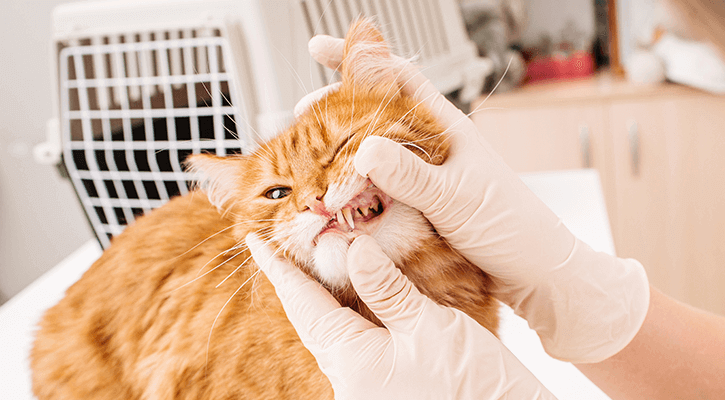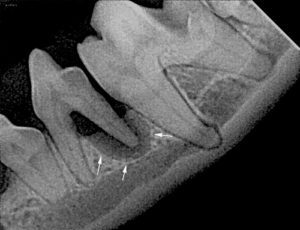
Dental Care
Here at Suttons Bay Animal Hospital, we offer pet dental care in Suttons Bay. The doctors and technicians have advanced training in dentistry, including oral surgery. Each anesthetized dental patient receives treatment from a team of medical staff members (doctor and licensed veterinary technician) in order to provide the most thorough and safest care possible for your pet.
Signs that your pet may need dental care:
- Bad breath
- Drooling or excessive salivation
- Dropping food from the mouth
- Pawing at the teeth or mouth
- Discoloration or staining of teeth
- Visible tartar on the teeth
- Red, irritated, swollen or bleeding gums
- Loose or missing teeth
- Changes in eating or chewing habits
- Difficulty eating
- Discharge from the nose
- Swelling under the eye
- Weight loss or loss of appetite
- Lethargy
- Shying away from you when you touch their mouth area
- Depression
If your pet is experiencing any of the above symptoms, give us a call today at 231-271-4260 for an appointment!
Dental Scaling & Polishing
Ultrasonic dental scaling and polishing can provide substantial benefits to your pet’s dental health as well as the health of other body systems. Every patient undergoing an anesthetic dental cleaning is monitored by a veterinary technician and is under the direct supervision of your veterinarian at all times. Continuous anesthetic monitoring is performed at all times including the pet’s blood pressure, body temperature, pulse oximetry, and capnography. Body temperature is monitored and maintained during the procedure and recovery by the use of heating pads and heating disks. During the procedure, your veterinarian will perform an oral examination and with the assistance of a licensed veterinary technician, chart your pet’s teeth. We record information about your pet’s teeth in a process called dental charting. We will evaluate the state of every tooth and make notes of its condition. This information is compared on each visit to evaluate the overall oral and dental health status to identify disease progression or improvement from treatment.
Process
The licensed veterinary technician will then remove all deposits of tartar from the teeth and under the gum line using specialized ultrasonic equipment along with subgingival hand scaling. Teeth and gingiva are probed for irregularities and pocket formations. Dedicated LVTs and assistants stay with your pet during recovery to ensure they are comfortable.
For the health of your pet, we recommend professional dental cleaning once yearly for most pets.
Pet Dental Disease
Pet dental disease is extremely common and affects nearly 80% of dogs and 70% of cats by three years of age. Dental disease may start out with just a mild plaque on the teeth and then proceeds to tartar build-up on the teeth. Tartar traps bacteria up against the gums so this can lead to gum irritation, also known as gingivitis.
In later stage dental disease, the gums can actually recess and the teeth can be so diseased that they can fall out. If left untreated, dental problems in dogs and cats can lead to larger systemic issues due to oral bacteria entering the bloodstream and damaging the kidneys, heart, and liver.
Additionally, bacteria and food debris accumulate around our pets’ teeth and, if unchecked, can lead to deterioration of the surrounding soft tissue and bone. This decay results in irreversible periodontal disease and may cause loss of teeth. If these problems are not caught and treated quickly enough, they can result in death.
Dental Radiography
We are so excited to now offer dental radiographs to our list of dental services! Dental x-rays in dogs are very similar to those taken in humans. It helps us to see the inside of your pet’s teeth and those areas below the gum line that are hidden from view.

It is very important for your pet to have his teeth radiographed because pets cannot simply tell us when their teeth are diseased or if they’re in pain. In many cases, x-rays are the only way for a veterinarian to know if your pet has a dental problem that can be treated, relieving discomfort. Cleaning your pet’s teeth without x-rays often results in missed opportunities to improve the quality of life and health of your pet.
Unlike humans, it is necessary for pets to be under general anesthesia for dental x-rays. They need to be completely still during the oral assessment, treatment and prevention procedures. Without anesthesia, the x-ray sensor would not be accurately placed. Anesthesia is tailored specifically for your pet and closely monitored during procedures and is considered to be very safe for your pet.
Pet Dental Care In Suttons Bay, MI
To schedule an appointment for pet dental care or pet dental cleanings in Suttons Bay, contact us today!
